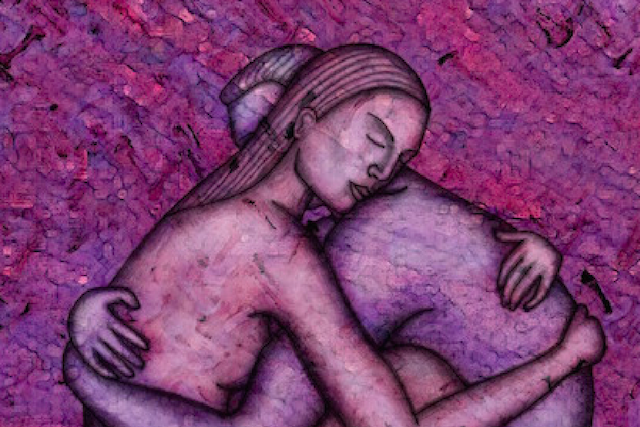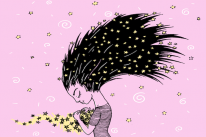
“I was feeling insecure you might not love me anymore.” ~John Lennon
After doing years and years of self-esteem work, I thought I was fairly well adjusted and secure. I thought I was fairly confident, self-assured, and not at all needy. But all that changed when I got into my recent relationship.
My subtle thought pattern of fear, distrust, projection, and unhappiness started creeping in. Again? Seriously? I thought I was past all that.
As it turns out my attachment disorder runs much deeper than I thought it did. What about yours? I mentioned attachment theory in one of my previous posts, but to elaborate…
Are You Insecure?
Attachment theory was first developed by John Bowlby in the 1960’s. This is an evolutionary theory of attachment, which suggests that children come into the world biologically pre-programmed to form attachments with others (caregivers) because this allows them to survive, and the way in which you attach during childhood becomes the prototype for all future attachments.
Bowldy asserts that there are three fundamental types of attachments which include secure, avoidant, and anxious attachment.
If you are secure, you probably aren’t reading this. Someone who is securely attached had a parent who was fairly stable and secure in meeting their needs. Because of this, as they become adults they assume other adults will meet their needs, so they do not suffer from relationship anxiety.
Secure individuals tend to be happier and more content in their relationships because they are acting and reacting from a secure place, which allows each partner to move freely within the world. They’re able to offer support to their partners and are more open and honest in their interactions
If you are avoidant, you may or not be reading this because often those who avoid intimacy often avoid introspection. If you are avoidant, you keep people at a distance and believe that you don’t really need others to exist in the world. Those who are avoidantly attached had a parent who was not really attentive to their needs, so the child learned to just avoid seeking reassurance.
Avoidant individuals tend to emotionally distance themselves from a partner. They believe they are better off alone (even if in a relationship) and live in an internal world where their needs are most important. Even avoidant individuals need connection, but when their partner looks to them for comfort they turn off their feelings and fail to react.
However, if you are at all anxious or insecurely attached, like I am, you are probably going to read this and say, “A Ha!” and a light bulb may even go off over your head. If you are anxiously attached, then you feel anxiety when your partner is separated from you or you do not feel emotionally reassured by them.
Anxious attachment derives from a parent who was emotionally and/or physically unavailable, non-responsive, and/or possibly intrusive.
People with anxious attachment are desperate to form a bond, but don’t actually trust their partner to meet their needs, so when their partner fails to assuage every emotion they have, they blame their partner or become jealous or critical. This often prompts their partner to distance themselves, thereby reinforcing their belief that they are not lovable.
Anxiously attached individuals continually seek external validation, as if still looking to that parent to soothe them and make them feel secure in the world. The problem with this is that it’s too much of burden for a romantic partner to carry and it isn’t their job.
Let’s Focus
I’m going to focus on anxious attachment and especially pre-occupied anxious attachment.
Let me ask this:
Are you pre-occupied with what you are or are not getting from your partner?
Are you self-critical?
Do you constantly seek approval and reassurance?
If your partner doesn’t react the way you think they should, do you blame or become upset?
Do you always anticipate your partner rejecting you, losing interest, or abandoning you?
Do you continually worry and obsess and not really trust them? If so, this is you.
This is me.
I have known that I was anxious for a while now and I have known and read about attachment theory, but I never really understood the depths to which it had inhabited my life, my thoughts, and my behaviors. I can’t explain why, but suddenly it all became so clear.
I don’t recall my infant years, but I do recall that when I turned four or five my mom pretty much left me alone. I could walk and talk and feed myself. She had things to do. I started playing next door at the neighbor’s house. He had toys and games and a swing. He had a hopscotch and candy and wood-making tools. We played. He paid attention to me. He also molested me.
When I was eight or so, my mom went back to work and left my sister and me alone. A friend of the family started coming over while she was gone. He also molested me.
But what does the molestation have to do with the attachment, you ask? I never really got it until now. Being left alone and being ignored by someone who was supposed to care for me literally put me in physical and emotional danger.
So, every time I get into a romantic relationship and I start to feel ignored (whether imagined or real), I freak out. I start to get palpitations. My brain starts to flood with thoughts and emotions. I start seeking reassurance.
For years I learned to push the feelings down and to ignore them.
What I didn’t realize is that you can’t do that. There is a thing called “primal panic,” which sets in when you are anxiously attached and not getting your needs met. What I didn’t know or understand is that when I feel ignored, my brain goes into “fight or flight” mode in order to protect itself. My brain believes it’s going to be taken advantage again and my body starts reacting.
Although I can logically understand this is not true, my brain does not subconsciously know it to be true and reacts accordingly.
What Happened
What this meant was that every infraction from my partner, every sense of injustice, every wrong step or every interpretation of a wrongdoing, no matter how slight, I met with a intolerability that I had no idea I was even imposing on my partner.
I would be so preoccupied with feeling better and getting them to make me feel better that I’d spend all my time and energy obsessing about how to get my needs met. And if they weren’t met properly, I would blame them and start to label them “untrustworthy.”
Think about it. If you haven’t heard from your partner in a day or so, do you automatically start thinking, “He/she doesn’t love me,” or “I knew he/she would do this,” or “I knew this would happen again”? Do you constantly think about what your partner isn’t giving you and what you aren’t getting?
Do you become calm and happy when your partner reassures you only to become anxious and insecure the minute you feel something is off or you feel you are being ignored or disrespected?
All of these things were (okay, sometimes still are) me in a nutshell.
The problem with all these feelings and behaviors is that they keep you from realizing true intimacy because you are living in fear and anxiety, and you may not even consciously realize it. You are living as if you are still that child who’s going to get hurt. But, guess what? You aren’t.
How to Fix It
Once I realized how this pattern was affecting my life, I knew I had to change it but I wasn’t sure how. I started doing some research. I read a few books including Insecure in Love.
One day I woke up and it had been two days since I had heard from my boyfriend. My body started going into panic mode. Where was he? Doesn’t he care? How can he do this? Maybe I should just leave him. My body and mind were going into panic mode. Anxiety set in. What should I do?
I tried some meditation but I couldn’t stop thinking and my heart wouldn’t stop racing. I decided to sit with the anxiety and think about why I was feeling anxious. What did I really feel? Why was I so anxious? Where was this coming from?
As I sat there and began to go deeper into the true meaning of my anxiety, I realized that I was literally feeling scared that someone would come hurt me. I was scared of being physically and emotionally alone and having no one there to rescue me. I realized that his ignoring me had triggered this subconscious belief that I’ve been holding onto that I never knew was there.
Then, I cried. I cried because I was scared. I was actually really petrified. Then, I told myself, “You’re okay. You will be okay. You are not there anymore. You are safe.” I cried and I reassured myself, and when I stopped and it was over the anxiety had lifted.
I had faced my fears. I had felt my pain and I had released it. I don’t think it will be gone forever, but it is gone for today and that is a good start.
Keep Trying
I thought I had dealt with all of this anxiety and insecurity stuff. I thought it was gone and buried. I thought I had made inroads into my new relationship and that because I had attracted a seemingly secure individual, it meant I was all better. Surprise! Insecurity was still running my life.
But, once I realized this to be true I made a vow that I would do whatever it takes to beat this insecurity over the head and run it out of my life.
I realized that if I kept going the way I was I would eventually push every boyfriend out of my life, and that I would never find a partner I was happy and content with. The truth can hurt.
I also realized that I’m not a bad person. I’m not mean or insincere or ruthless. I’m scared. I have a biological response to a real experience. I learned this coping mechanism to help me survive and it did its job, but its time has come and it needs to retire.
If you are insecurely attached and seek constant external validation and approval to feel good about yourself, how long do you think your partner will put up with it? It isn’t their job to make you feel better about yourself. Yes, they can and should support you and be encouraging, but you have to learn to support and encourage yourself.
If you want to find true love you have to learn to love yourself, as cheesy as that sounds, and if you are anxiously attached you also have to learn to calm yourself, reassure yourself, and comfort yourself. The past is over and you cannot change it, but the future has not yet occurred.
Do you want to be your own worst enemy or your own best friend? You decide. I know my answer.
About Carrie L. Burns
Carrie L. Burns is a blogger on a mission of self-discovery. As a sexual abuse survivor that struggled for years with depression anxiety, low self-esteem, lack of self-love, and relationship issues, she found her purpose through writing and sharing her story with others. Check out her other writing at www.acinglife.com.













 Though I run this site, it is not mine. It's ours. It's not about me. It's about us. Your stories and your wisdom are just as meaningful as mine.
Though I run this site, it is not mine. It's ours. It's not about me. It's about us. Your stories and your wisdom are just as meaningful as mine. 